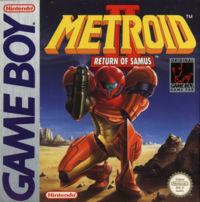Metroid II: Return of Samus

| |
| Return of Samus | |
| Full Title | Metroid II: Return of Samus |
| Developer | Nintendo R&D1 |
| Publisher | Nintendo |
| System | Game Boy, 3DS Virtual Console |
| Release Date | Game Boy US August 26, 1991 JP January 2, 1992 EU May 21, 1992 3DS Virtual Console JP September 28, 2011 US/PAL November 24, 2011 SK June 15, 2016 |
| Genre | Action/Adventure |
| Gallery | GH Gallery |
Metroid II: Return of Samus is the follow-up to the original Metroid. It was released for the Game Boy four years after the first game and was the first handheld title in the series, despite most other series continuing on the Super NES at the time.
Story[edit]
Metroid II follows the story of the original Metroid. After the Space Pirates had been defeated on Zebes, the Galactic Federation had decided it was too dangerous to leave the Metroids alive. After repeated failures from different Federation teams, they decided to enlist Samus Aran to finish off the Metroids. Samus's mission took her into the heart of SR388 where it was discovered the Metroids had gained far more advanced evolutions thanks to the gamma radiation on the planet.
Gameplay[edit]
Metroid II brought back with it all the elements that made the original Metroid memorable. Samus retained most of her abilities from the previous game, while the others could be found as the player progressed through the game. New abilities included the the Spider Ball and Spring Ball, allowing a new dimension of flexibility for the Morph Ball. Some other gameplay features from the first game were also tweaked, such as the aiming of Samus's gun.
Like the previous game, open exploration was encouraged. The game had a counter of the number of surviving Metroids. The player had to explore the caverns in search of these Metroids. Each Metroid is actually an evolved form of the original Metroid and is fought in a miniboss or boss-like battle. As the Metroids are destroyed, the planet's lava will slowly receded to open up new areas.
Continuity Notes[edit]
- Metroid II was initially a direct sequel to Metroid, although the passage of time between the two titles is unspecified. The Metroid Prime subseries has since been established as taking place between Metroid and Metroid II.
- This game notably features the near-extinction of the Metroid species and sets up the last Metroid hatchling for its appearance in Super Metroid, although later games would establish the existence of Federation cloning programs which create more Metroids.
Legacy[edit]
Because of the lack of a map, Metroid II and its predecessor are often considered the most challenging in the series. This one can be considered somewhat easier to navigate through due to areas being more diverse than in the original. However, the game is often the neglected member of the series, partly because of it being on the Game Boy and partly from lacking the villainous Space Pirates that appeared in the rest of the series. It is still notable for non-Japanese gamers as the first in the series to allow battery saving.
Ports and Remakes[edit]
- A colorized version of Metroid II called Metroid II: Return of Samus DX was planned in 1999, but was cancelled along with Kirby's Dream Land 2 DX.
- In March 2000, Metroid II was released for download in Japan through the Nintendo Power system.
- The original version of Metroid II was released for download over the 3DS's eShop as part of the 3DS Virtual Console in 2011.
- It received an expanded remake on the Nintendo 3DS in 2017 as the similarly-titled Metroid: Samus Returns. This remake retooled the graphics and added gameplay elements from games that had come out since Metroid II while also introducing new features.
- In February 2023, the original game was among the first wave of games to be added to the Nintendo Switch's library of Game Boy games for Nintendo Switch Online subscribers.
Sequels[edit]
In 1994, Super Metroid was released for the Super Nintendo.
| Titles in the Metroid Series |
|---|
| Metroid (Zero Mission) - Return of Samus (3DS) - Super Metroid - Other M - Fusion Metroid Prime - Pinball - Echoes - Hunters - Corruption - Federation Force - 4 Metroid Dread |